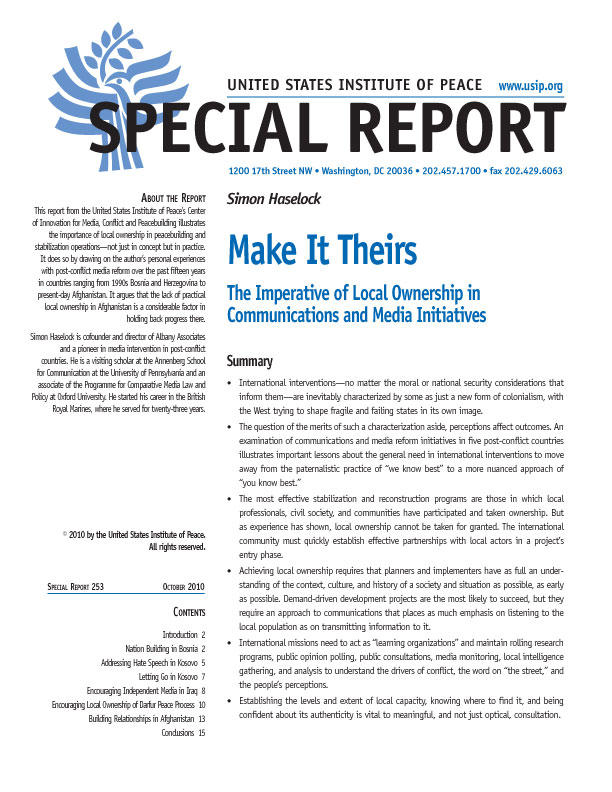Make It Theirs
This report from the United States Institute of Peace’s Center of Innovation for Media, Conflict and Peacebuilding illustrates the importance of local ownership in peacebuilding and stabilization operations—not just in concept but in practice.

Summary
- International interventions—no matter the moral or national security considerations that inform them—are inevitably characterized by some as just a new form of colonialism, with the West trying to shape fragile and failing states in its own image.
- The question of the merits of such a characterization aside, perceptions affect outcomes. An examination of communications and media reform initiatives in five post-conflict countries illustrates important lessons about the general need in international interventions to move away from the paternalistic practice of “we know best” to a more nuanced approach of “you know best.”
- The most effective stabilization and reconstruction programs are those in which local professionals, civil society, and communities have participated and taken ownership. But as experience has shown, local ownership cannot be taken for granted. The international community must quickly establish effective partnerships with local actors in a project’s entry phase.
- Achieving local ownership requires that planners and implementers have as full an understanding of the context, culture, and history of a society and situation as possible, as early as possible. Demand-driven development projects are the most likely to succeed, but they require an approach to communications that places as much emphasis on listening to the local population as on transmitting information to it.
- International missions need to act as “learning organizations” and maintain rolling research programs, public opinion polling, public consultations, media monitoring, local intelligence gathering, and analysis to understand the drivers of conflict, the word on “the street,” and the people’s perceptions.
- Establishing the levels and extent of local capacity, knowing where to find it, and being confident about its authenticity is vital to meaningful, and not just optical, consultation.
- Peacebuilding and counterinsurgency are about politics, which is in turn about persuasion and consensus. Because all politics is local, this means that two-way grassroots communications are crucial for success on either front.
- Communicating to the grass roots requires an understanding of how information is transmitted across a society and the way in which traditional networks are used. As a result, communicating in traditional tribal societies often requires unconventional approaches.
- The current international narrative on Afghanistan revolves around the timeline for military withdrawal and handover. The concept of Afghan ownership looms large on the agendas of politicians, diplomats, and soldiers alike as the clock starts ticking. But successfully transferring ownership is first about understanding culture and context—and that requires effective two-way communication.
About the Report
This report from the United States Institute of Peace’s Center of Innovation for Media, Conflict and Peacebuilding illustrates the importance of local ownership in peacebuilding and stabilization operations—not just in concept but in practice. It does so by drawing on the author’s personal experiences with post-conflict media reform over the past fifteen years in countries ranging from 1990s Bosnia and Herzegovina to present-day Afghanistan. It argues that the lack of practical local ownership in Afghanistan is a considerable factor in holding back progress there.
Simon Haselock is cofounder and director of Albany Associates and a pioneer in media intervention in post-conflict countries. He is a visiting scholar at the Annenberg School for Communication at the University of Pennsylvania and an associate of the Programme for Comparative Media Law and Policy at Oxford University. He started his career in the British Royal Marines, where he served for twenty-three years.



